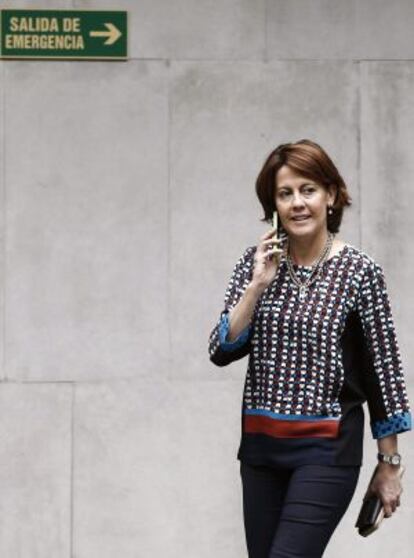Corruption rows cause gridlock in Navarre’s regional assembly
Opposition parties gang up on conservative regional premier to prevent legislation being passed

The conservative Navarrese People’s Union (UPN) government of regional premier Yolanda Barcina has seen its legislative initiatives stymied over the past 18 months by the combined opposing votes of five parliamentary groups of disparate political leanings.
The gridlock is such that the only way out is to hold early elections, most likely on May 25, a year ahead of the end of Barcina’s mandate. No party has every managed to secure an absolute majority in the region, with the UPN and the Navarre branch of the Socialist Party (PSN), alternating in power with the mutual support of each other. Former UPN premier Miguel Sanz compared the political scenario in Navarre to the wedges players of Trivial Pursuit have to get to fill in their “cheeses” to win the game.
Barcina has described the current legislature as the “most difficult” since the restoration of democracy. The UPN has governed alone with 19 seats in the 50-member regional assembly since June 14, 2012 when Barcina called the PSN leader and the then-deputy premier, Roberto Jiménez, with whom she has had a tumultuous personal relationship, to say that she was expelling him and his party from the government.
The parties that have blocked UPN’s initiatives – PSN Izquierda-Ezkerra and the Basque nationalist groups Bildu, Aralar and Geroa Bai – hold 27 seats in the assembly. Only the conservative Popular Party’s (PP) four regional lawmakers have sided with the UPN in the assembly and then not always.
The deputy premier has been accused of influence-peddling at the region's tax department
The Navarre administration has used an extension of the last budget passed by the regional assembly in 2012 for last year and this year. In addition to the opposition the UPN has suffered on a regional level, the PP government of Prime Minister Mariano Rajoy has presented appeals against 14 laws that have been approved by the regional assembly with the Constitutional Court, while the regional opposition parties have accused Barcina of using the excuse of Rajoy administration to block legislation that the majority want to see enacted such obliging the Catholic Church to pay local real-estate based rates on properties they own which are not used for religious purposes.
The Navarre assembly has also passed a law banning fracking in the region, which is also likely to be appealed.
Barcina looked set to see her term through to 2015 despite finding herself implicated in a scandal concerning expenses she received as a member of a parallel management board of local savings bank Caja Navarra due to a veto by the national Socialist Party in Madrid on the PSN calling on the votes of the left-wing abertzale Bildu group it needs to successfully present a censure motion against Barcina’s government. In an interview last week with EL PAÍS, Barcina said she would “never do a deal with” Bildu, which is a successor to the banned political wing of the ETA terrorist organization, Batasuna.
However, last week the former director of the Navarre tax department (the region raises its own taxes), Idoia Nieves, accused the deputy premier, Lourdes Goicoechea, of influence-peddling at the department, leading the Socialists to remove its ban on the PSN counting on the 13 votes of Bildu and Aralar to push a censure motion through the assembly. The PSN’s plan is now to try and demonstrate that the accusations levied by Nieves against Goicoechea are founded. Speaking on Tuesday, Socialist leader Alfredo Pérez Rubalcaba criticized the “ungovernable” state of the region while explaining that his party “does no deals with Bildu.”
Tu suscripción se está usando en otro dispositivo
¿Quieres añadir otro usuario a tu suscripción?
Si continúas leyendo en este dispositivo, no se podrá leer en el otro.
FlechaTu suscripción se está usando en otro dispositivo y solo puedes acceder a EL PAÍS desde un dispositivo a la vez.
Si quieres compartir tu cuenta, cambia tu suscripción a la modalidad Premium, así podrás añadir otro usuario. Cada uno accederá con su propia cuenta de email, lo que os permitirá personalizar vuestra experiencia en EL PAÍS.
En el caso de no saber quién está usando tu cuenta, te recomendamos cambiar tu contraseña aquí.
Si decides continuar compartiendo tu cuenta, este mensaje se mostrará en tu dispositivo y en el de la otra persona que está usando tu cuenta de forma indefinida, afectando a tu experiencia de lectura. Puedes consultar aquí los términos y condiciones de la suscripción digital.








































